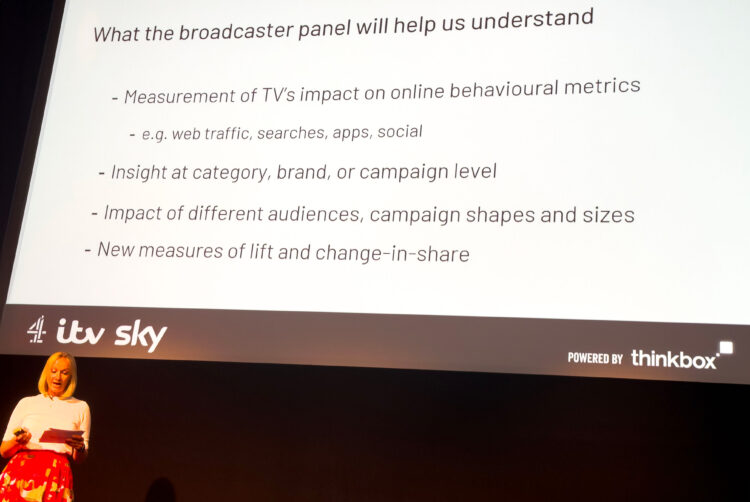ITV, Sky, C4 reveal Lantern audience measurement launch


ITV, Sky and Channel 4 are set to launch a joint measurement panel aimed at tracking the short-term impact of TV advertising on sales in a move they say will give the sector “the measurement it deserves”.
Addressing an audience of advertisers at a Thinkbox event in London, the UK’s major commercial broadcasters revealed the proof of concept for Lantern, which has been in development for several months.
It aims to give advertisers much more information to the question “Did my TV campaign work?” by pooling data and tracking the behaviour of consumers after they were shown particular ads.
The broadcasters have already been collaborating on measurement for three years through their joint venture CFlight, which captures overall deduplicated reach and frequency.
Kelly Williams, managing director of ITV Commercial, said: “[Lantern] allows any advertiser to measure the short-term effects of TV, because they are very powerful, as well as the established brand-building effects of TV. We’re very excited about it.”
The aim is that the collaboration will improve data-sharing, reduce costs and provide new industry benchmarks for TV ads measurement.
Sameer Modha, data and effectiveness lead for ITV’s Commercial Strategy team, said: “Telly is an amazing ad product and, by collaborating on a multi-outcome measurement panel, we can give it the measurement that it deserves. We can shine a light on the range of business impacts for your brand.”
Karin Seymour, client and marketing director at Sky Media, added: “A broadcaster panel can help us identify a range of different behaviours that result from the advertising exposure.
“We can see what happens in terms of online behavioural metrics… we can also provide insight into whole categories at brand or campaign level that are too granular for techniques like media mix modelling to actually measure.
“We can bring in variables such as category, brand, campaign level and then we can look at the impact of different audiences and campaign shapes and sizes, and then bring in new measurement metrics such as lift and change in share.”
While TV may be well-known to advertisers as a highly effective brand-building medium, Lantern may help the broadcasters yield more performance spend from advertisers.

Seymour continued: “When we dig a little deeper, what you can actually see as well is that it’s also the performance end that TV is very effective. TV comes only second to generic [paid search] in terms of contribution. And then when we actually look at carryover, which is profit contribution measured over 13 weeks after that ad exposure, linear TV tops the charts.”
Citing Thinkbox’s Profit Ability 2 research, Seymour highlighted that TV contributes 55% of a brand’s “advertising-driven profit contribution”, but only commands 44% in spend. The same study concludes £1 invested in advertising returns £4.11 in profit.
Despite Lantern being only “halfway through the build”, the broadcasters told an audience of marketers and agencies on Wednesday that they were keen for volunteers to provide input into the proof of concept by the end of the year, ahead of a formal launch.
The project is being developed with Measure Protocol, a company that offers privacy-safe user data-sharing.
Modha said: “They’ve already got two, three years’ worth of historical data. And that is where the power of this collaboration really lands, because then we can go to the 4m Sky panel, and the 2m YouView devices, and we can reach into those enormous datasets and pull out the historical TV records for the people that match the panel that we’re working with.”
Advertising generates profit, but not all media channels are equal
